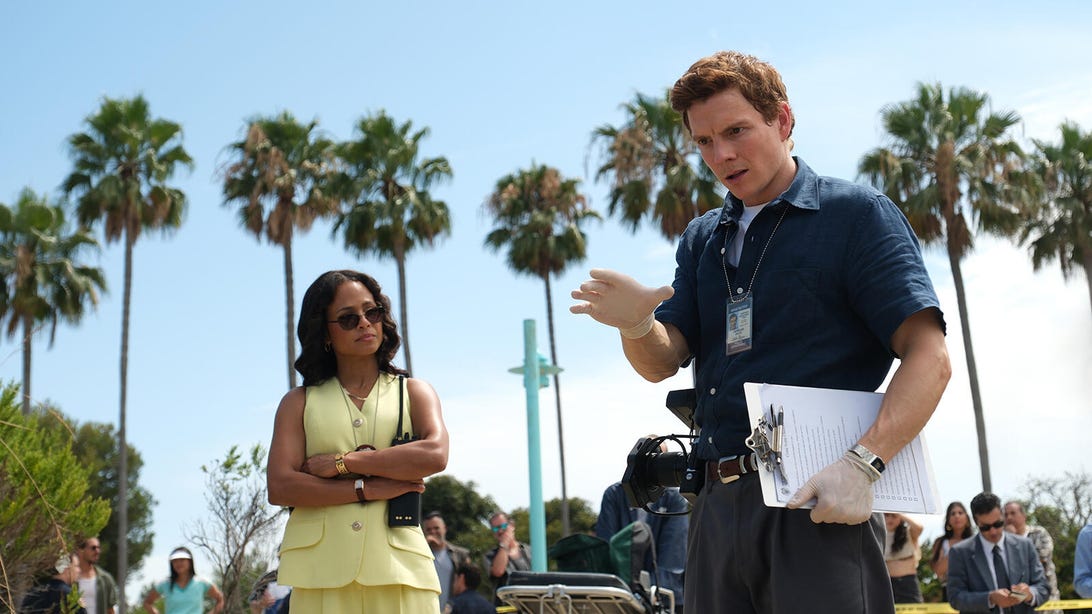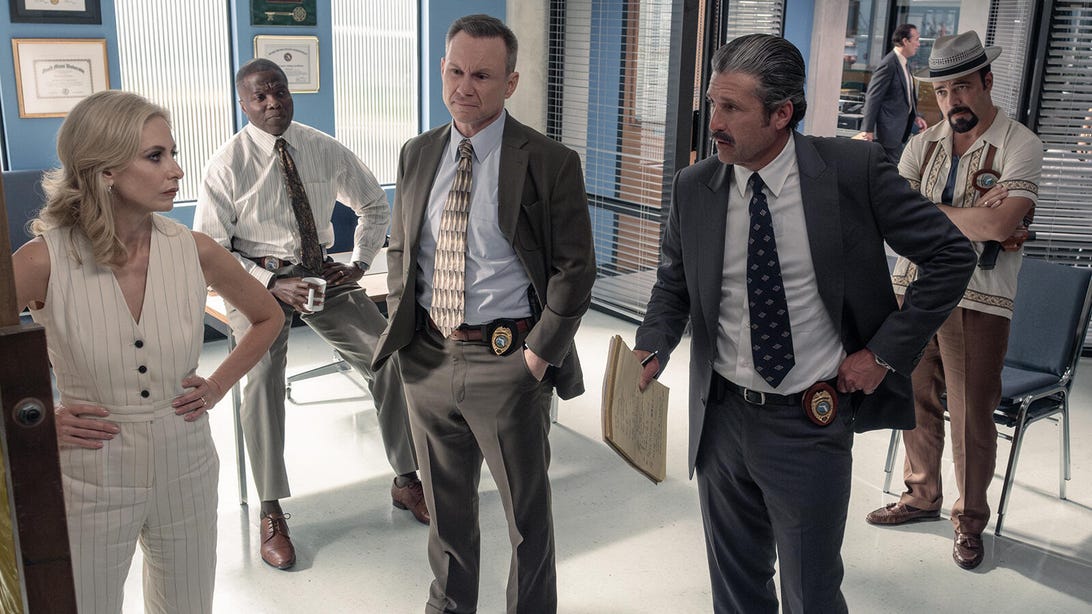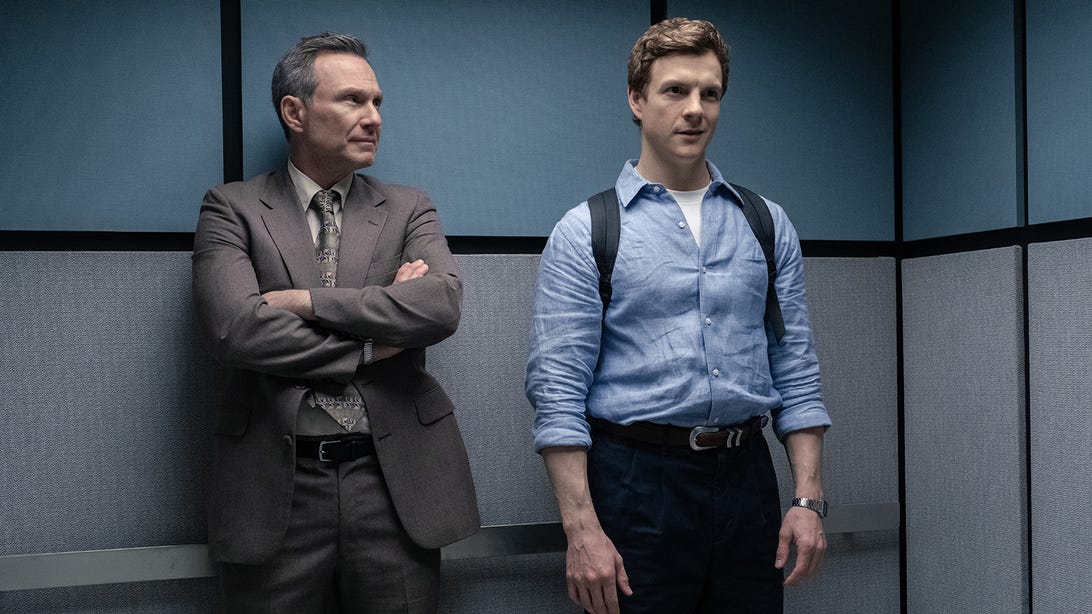Join or Sign In
Sign in to customize your TV listings
By joining TV Guide, you agree to our Terms of Use and acknowledge the data practices in our Privacy Policy.
Dexter: Original Sin Isn't Taking Advantage of Its New Blood
If the Dexter prequel wants to justify its existence, it needs to stop leaning on familiar characters

Christina Milian and Patrick Gibson, Dexter: Original Sin
Patrick Wymore/Paramount+ with Showtime[Warning: The following contains spoilers for the first six episodes of Dexter: Original Sin.]
From the beginning, Dexter: Original Sin has had the tough task of justifying its own existence. Within the continuity of this ever-expanding franchise, the series is ostensibly a bridge, a way of closing the gap between the final scene of Dexter: New Blood and its upcoming sequel series, Dexter: Resurrection. On his supposed deathbed, serial killer Dexter Morgan's (Michael C. Hall) life flashes before his eyes, and he thinks back to his early killing days — days that coincide with his introduction to the Miami Metro Police Department.
Few viewers were pushing for this particular chapter of Dexter's biography to be told; much of the original series already covered the nascency of Dexter's double life, with Hall donning some tragic wigs to portray a version of the character around the same age. And there's little reward to meeting younger versions of Dexter's coworkers, such as María LaGuerta (originally played by Lauren Vélez), Angel Batista (David Zayas), and Vince Masuka (C. S. Lee), here played by Christina Milian, James Martinez, and Alex Shimizu in impressive imitations. Those characters were inconsistent at best in the original run, and there's not much value in spotlighting them at an earlier stage in their careers. In the end, this series exists for one reason: People love Dexter, and they want more of it, no matter whether there's actually any story left to tell.
Over the course of Original Sin's first six episodes, the prequel has run into the essential problem inherent to its premise: We know where this story ends. We know that this Dexter (played by Patrick Gibson) will never get caught and that most of the "Bay Harbor Butcher" victims won't even be discovered for over 15 years, and we know what will become of his adoptive father, Harry (Christian Slater, taking over the role from James Remar), and younger sister Debra (Molly Brown, taking over for Jennifer Carpenter). There are serious constraints on the plot: There's no tension about whether Dexter's extracurricular activities will become known to most of the characters. Ironically, it's an issue that the original series struggled with after a while, since the writers were unable or unwilling to expose Dexter before the very end.
There are ways around the prequel problem, even sticking with the slightly irrelevant timeline during which Original Sin is set. One way is to lean into tragic inevitability. Look at the miracle of Better Call Saul, a prequel that arguably equaled Breaking Bad despite centering on a supporting character who most often served a comic-relief role — and took six whole seasons to depict that character's slow-motion downfall. Of course, comparing a Dexter revival to Better Call Saul is setting up the former to fail. But the same principle applies to other successful unnecessary-in-theory TV prequels, including Bates Motel.
There's another crucial element most prequels have in common: new characters. Yes, you could tune in to Better Call Saul and reliably encounter big Breaking Bad alumni like Mike Ehrmantraut (Jonathan Banks) and Gus Fring (Giancarlo Esposito) for a steady source of fan service. But the show sometimes risked overexplaining during those segments — stretching out the construction of Gus's underground meth lab to a whole season, for example. The show wouldn't have landed like it did without the new additions, the wild cards whose unexplained absences during the timeline of the parent show sustain many of the series' core mysteries, like Jimmy's (Bob Odenkirk) brother Chuck McGill (Michael McKean), along with Nacho Varga (Michael Mando), Howard Hamlin (Patrick Fabian), and especially Kim Wexler (Rhea Seehorn). They're fascinating variables throughout the prequel, people who could wind up dead or in jail or destitute by the time of Breaking Bad.

Sarah Michelle Gellar, Reno Wilson, Christian Slater, Patrick Dempsey, and James Martinez, Dexter: Original Sin
Patrick Wymore/Paramount+ with ShowtimeDespite some issues, Dexter: New Blood understood the necessity of injecting some, well, new blood. And Original Sin also seems to get it, to a degree. Rather than casting a younger actor to portray Geoff Pierson's Capt. Thomas Matthews, a character already established as a close and respected friend of Harry on the force, the show introduces us to Capt. Aaron Spencer (Patrick Dempsey), who serves a similar role. Is the show setting him up to die, only to replace him with Matthews in a theoretical second season? (The show also hasn't introduced a younger version of Erik King's iconic Sgt. Doakes yet.) There are two other new prominent characters absent by the time of Dexter: Harry's partner Bobby Watt (Reno Wilson) and chief of forensics Tanya Martin (Sarah Michelle Gellar).
These are three new colleagues whom the older Dexter never mentioned… and yet the show hasn't given them much to do, with the title character or otherwise. Bobby is an amiable presence, but he's more of a scene partner for Harry in the flashbacks than a well-developed character in his own right. And of all the useless subplots in Original Sin, that ongoing flashback story might be most galling.
Again, we know this story already: Harry had an affair with Laura Moser, his confidential informant tasked with collecting evidence against drug kingpin Hector Estrada. Despite Harry's promise to protect Laura, Estrada found out she was a rat and had her brutally murdered in a shipping container right in front of her two young sons: Dexter and Brian, both of whom would become serial killers as adults. Harry adopted Dexter.
Every episode of this series so far has featured at least one of these 1973 flashbacks, often multiple, and watching these events play out on screen is basically pointless. There's almost no new information, and when there is — like the reveal that Harry and his wife Doris lost a heretofore unmentioned son in a drowning accident that same year — it screams of awkward retconning.
This is an effect of the same misplaced priorities as the present-day storyline: the writers have chosen to focus on a familiar period, sticking with familiar characters and events instead of developing anyone new or depicting a surprising story from Dexter's or Harry's past. That impulse is understandable; when you're tuning in to a Dexter prequel, you're there to see Dexter and Harry, not some new detective named Bobby Watt. And credit where credit's due: "F Is for F--- Up," Episode 5, does feature a genuinely inspired moment. That would be Dexter stripping his father naked and putting him on the killing table like one of his victims, a twisted way of preventing Harry from committing a drunken act of vigilante justice that would've ruined his life. This is what Original Sin needs more of.
But paying a little more attention to the rest of the ensemble would help give this story some weight. At least Dempsey finally gets some meaty material in the most recent episode, "The Joy of Killing." Spencer's son Nicky has been taken hostage by the same kidnapper who killed Jimmy Powell, and he's involving himself in the investigation despite the risks. This could put him in Dexter's path in the final four episodes to come; Dexter can't stand people who hurt kids, so Spencer might offer a sympathetic ear. Of anyone, he's the character most primed to compromise his values right now, so Dexter's plans might not seem so awful — if a child-killer happens to not wake up the next morning, so be it.
But it has taken six episodes to get to this moment, and Dexter and Spencer still don't have any relationship of their own. Why not give Dex a new professional mentor, someone who can offer some new perspective for a budding blood spatter analyst and budding vigilante? Tanya is another natural choice for that role, given that she's his direct superior. But she tends to only appear on screen to crack an occasional joke or offer Dexter some stern words about how he's not as smart as he thinks he is yet. There's potential in this dynamic, but the show isn't capitalizing on it at all.
Perhaps the problem is that this version of Dexter doesn't need a new mentor because he came fully formed in the premiere, already equipped with Harry's advice for handling his Dark Passenger. Sure, he doesn't have his whole killing ritual figured out yet, and he slips up from time to time; the show does excel when it leans into his faults, like when a slip-up with a killer named Mad Dog (Joe Pantoliano) leaves the man dead in the middle of the street instead of a swamp on Interstate 75. The cliffhanger ending of "The Joy of Killing," which reveals that the police have discovered the body parts of Dexter's victims in that very hiding spot, should offer some "How will he get out of this one!?"-type excitement. That type of story can work well, even if we know the whole time that he absolutely will get out of this one.

Christian Slater and Patrick Gibson, Dexter: Original Sin
Patrick Wymore/Paramount+ with ShowtimeBut for the most part, this is already the Dexter we know and love, covering his walls with plastic sheeting even in his first-ever kill room back in Episode 1. He's less precise and forward thinking, maybe, but we know that the consequences of his mistakes can only be so bad. The show doesn't leave him any room to grow or give him any truly compelling struggles at work, and thus there's no particular arc to his relationship with his coworkers, including the new characters.
ALSO READ: The complete guide to winter TV
Many have speculated that Tanya will play a big role in the endgame of this series (or season) — perhaps she's the new Doakes, the one character who manages to sniff out Dexter and then gets killed for her efforts to bring him to justice. Or maybe she'll end up the surprise antagonist, the person who murdered Jimmy Powell and might murder Spencer's son. If either theory is proven correct — and I think there's a strong likelihood either way that Tanya won't make it out of this season alive, especially given Gellar's special guest star status — the show will have failed to build to that reveal properly. If Tanya is indeed Dexter's big final kill of the season, shouldn't we be spending more time with her while she's here? Shouldn't it all mean something? Shouldn't there be a reason Dexter is thinking back to this time on his deathbed?
I imagine that to many Dexter super-fans, Original Sin is a dream come true: an opportunity to once again luxuriate in the nostalgia of this world they love, to watch a young Dexter Morgan dip a toe into the waters of murder and then breeze through the doors of Miami Metro with a smile on his face and a signature box of donuts in hand. For me, though, this series has already spent too much time reveling in that familiarity, seemingly afraid to present any angle or relationship that could bring out something new in a character we already know so well.
And the show also isn't interested in reconciling the various versions of itself, from the strong early days to the mess of latter-day Dexter. We're given the chance to watch a young Dex and Deb take edibles and bond, for example, but not to remember the sticky details of that weird time in Season 6 and 7 when Deb realized she was in love with her own brother. Dexter: Original Sin is about cherry-picking the salvageable parts of this malleable continuity and trying to do it all over again, with roughly the same characters and even fewer consequences. And sure, why not? Stay as long as you like; you know exactly what you're getting.
New episodes of Dexter: Original Sin stream Fridays on Paramount+ with Showtime and air Sundays at 10/9c on Showtime.